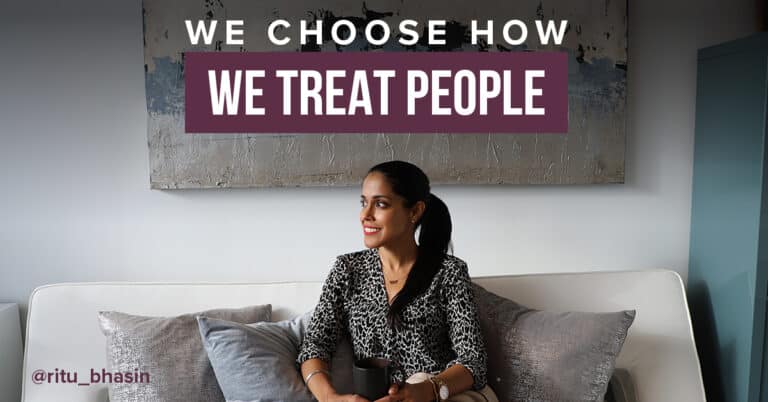As Leaders, We Choose How We Treat People

A few years ago, during a therapy session, I shared with my therapist that I had noticed how snippy I was being with people around me. From my clients, to my team members, to my Uber drivers, to my spouse, everyone was experiencing my crankiness.
And this is when she shared the following pearl of wisdom with me: “Ritu, you choose how you treat others – even when you’re stressed.”
I’ve been reflecting a lot on this life-changing insight, because I’ve had several people share with me recently that their leaders seem overwhelmed by all that’s on their plates. But the problem is that it’s resulting in the leaders being irritable, curt, and sometimes even disrespectful.

As I just shared based on my own grumpiness, I understand why we do this. But I also now deeply understand that we, as leaders, often know when we’re being unpleasant, and we can *choose* to:
- Alter our behavior
- Not take our frustrations out on others
- Communicate more effectively
Every behavior we engage in as a leader is a choice – especially in this moment in time when our workplaces are desperate for more leadership that’s rooted in psychological safety, empathy, inclusion, belonging, and trust. (A concept that I call “Shift Leadership” – more on this coming up in future blogs!)
After having this a-ha moment and reflecting on what my therapist told me, there are a few things that I now do when I find myself starting to get snappy with others. And I’d like to share them with you:
- Acknowledge your feelings – start by acknowledging and sharing that you’re struggling. I will literally say to myself, “You’re on edge right now. You’re feeling frazzled and that’s because you’re stressed.” By being more honest and authentic with yourself about what you’re feeling, you’ll be more mindful about making better choices in how you treat yourself and others. And of course, this helps us to ultimately cultivate more psychological safety, empathy, inclusion, and belonging in our relationships with our team members.
- Take a pause – the simple act of deliberately slowing down by pausing before you say or do something can be so helpful in changing how you treat people. It allows you to stop for a quick moment to think about how you’re feeling, what you want to say, and how you want to say it – all before you actually share. Plus, it gives you a moment to focus on using your Core Wisdom (as I talk about in my award-winning and bestselling book WE’VE GOT THIS).
- Reflect on how you want to treat others – in moments when you’re feeling calm and grounded, ask yourself how you want people to feel when they leave your interaction – especially in your efforts to foster heightened psychological safety, empathy, inclusion, and belonging in how you’re leading. Ask yourself:
- How do I want to treat people?
- How do I want to make people feel?
- What can I do to make my interactions feel more respectful?
I note that when I remind myself that I don’t want to make people feel demoralized, I am more mindful about being kind.
I know firsthand how hard leadership can be… but, at the end of the day, I always come back to this: it’s about the interconnectedness of being. I want my actions to contribute to others’ wellness and the betterment of the world. Because this is what leading with psychological safety, empathy, inclusion, and belonging in mind is all about.
Are you with me?
I’d love to hear from you! Please send me a message through our Contact Us page, LinkedIn, or Instagram.
Reach out to the bci team here to learn more about our range of cutting-edge programming on how to cultivate inclusion in the workplace.
If you’re looking for more resources on how to create cultures of belonging, empathy, psychological safety, and inclusion, check out:
- Blogs:
- Tip Sheets:
- Worksheets:
- Playlists:
